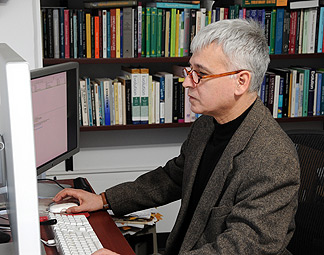Dr. Aviv Bergman Named Founding Professor and Chai
Dr. Aviv Bergman Named Founding Professor and Chair of Newly Created Department of Systems & Computational Biology at Einstein
April 7, 2008 - (BRONX, NY) - Aviv Bergman, Ph.D., has been named Founding Professor and University Chairman of Einstein's newly created Department of Systems and Computational Biology. The appointment was announced by Allen M. Spiegel, M.D., the Marilyn and Stanley M. Katz Dean of the Albert Einstein College of Medicine.
 "We've created this new department as a direct outgrowth of our strategic research plan at Einstein, which recognized that there was the need for a new approach for dealing with emerging 21st century challenges and opportunities in medical research," said Dr. Spiegel. "Aviv is one of the architects who helped envision the Department during our strategic planning process, and I am confident that his vision and experience make him an excellent choice to lead Systems and Computational Biology in the collaborative endeavors that lie before us."
"We've created this new department as a direct outgrowth of our strategic research plan at Einstein, which recognized that there was the need for a new approach for dealing with emerging 21st century challenges and opportunities in medical research," said Dr. Spiegel. "Aviv is one of the architects who helped envision the Department during our strategic planning process, and I am confident that his vision and experience make him an excellent choice to lead Systems and Computational Biology in the collaborative endeavors that lie before us."
Dr. Bergman began his career at Einstein in July 2004 and has been serving as a professor in the Departments of Pathology and Neuroscience. He came to Einstein from Stanford University, where he was founder and co-director of the Center for Computational Genetics and Biological Modeling as well as the founder and director of the Center for Integrative Research in Science and the Humanities. Systems and computational biology combines computation (computer modeling and analysis of large data sets), mathematics and biological experiments in multidisciplinary research programs to answer fundamental questions in biology, ranging from the function of biological systems to understanding how life's diversity evolves. This approach, which uses both theoretical and experimental methodologies, is particularly applicable to studying complex states such as cancer, neuropsychiatric diseases, and aging.
Dr. Bergman's research focuses on the evolution of complex biological systems and networks, such as the interactions that occur among genes or proteins. In one recent study, for example, Dr. Bergman and his colleagues, using numerical simulations of complex gene networks, demonstrated a novel mechanism by which most, or perhaps all, genes reveal observable variation at the system level when their function is compromised.
Dr. Bergman is a strong proponent of interdisciplinary collaborations in which theoreticians and laboratory scientists work together to advance scientific knowledge. "We aim at integration that respects the values of existing disciplines: serious, sustained, and multidisciplinary discussions of matters that concern all the researchers involved and on which all have something to contribute," Dr. Bergman says. "To the extent that a real unity of scholars across disciplinary boundaries is possible, it is best achieved by working together on actual projects that bring scientists from diverse backgrounds together." In his tenure at Einstein, for example, Dr. Bergman has teamed with researchers in a number of areas including head and neck cancer, aging, immunology, and neurodegenerative diseases.
With the help of numerous faculty recruits that he plans to hire within the next five years, Dr. Bergman will expand such research collaborations into other areas of biomedical research. He will also be working to educate students, researchers and faculty throughout the medical school regarding the role that systems-level research, modeling, and computation will play in many research projects over the next decade. As part of that effort, Dr. Bergman will offer a series of introductory lectures and seminars to help Einstein scientists better understand how systems, theoretical, and computational biology can contribute to their research.
Dr. Bergman studied physics in Israel and received a Ph.D. in biological sciences from Stanford University. He is currently the Principal Investigator of an NIH grant entitled "A Systems Methodology for the Biology of Aging" and the Principal Investigator for part of an Einstein Program Project, "Systems Biology Approach to Identify the Longevity Gene." Dr. Bergman is the recipient of the Samuel Karlin Prize in Mathematical Evolutionary Theory from Stanford and is a member of several scientific societies.
###
Other Top Stories
9/11 World Trade Center Exposure Linked to Heart Disease Among NYC Firefighters
On Becoming a Physician: New Einstein Students Receive White Coats and Stethoscopes
Novel Therapy for Acute Migraine Shows Promise in Phase 3 Clinical Trial
First Complete Wiring Diagram of an Animal's Nervous System
Multimillion Dollar NIH Grant to Help Reduce Opioid Use & Get Care to People Who Need It
NIH Grant Funds $23 Million Study of Diseases Affecting People Living with HIV
New TAILORx Data Guides Adjuvant Therapy in Younger Breast Cancer Patients
Einstein Celebrates Its 61st Commencement
Bolstering Biopsies: Testing Patients' Individual Cells to Guide Treatment



Tablet Blog